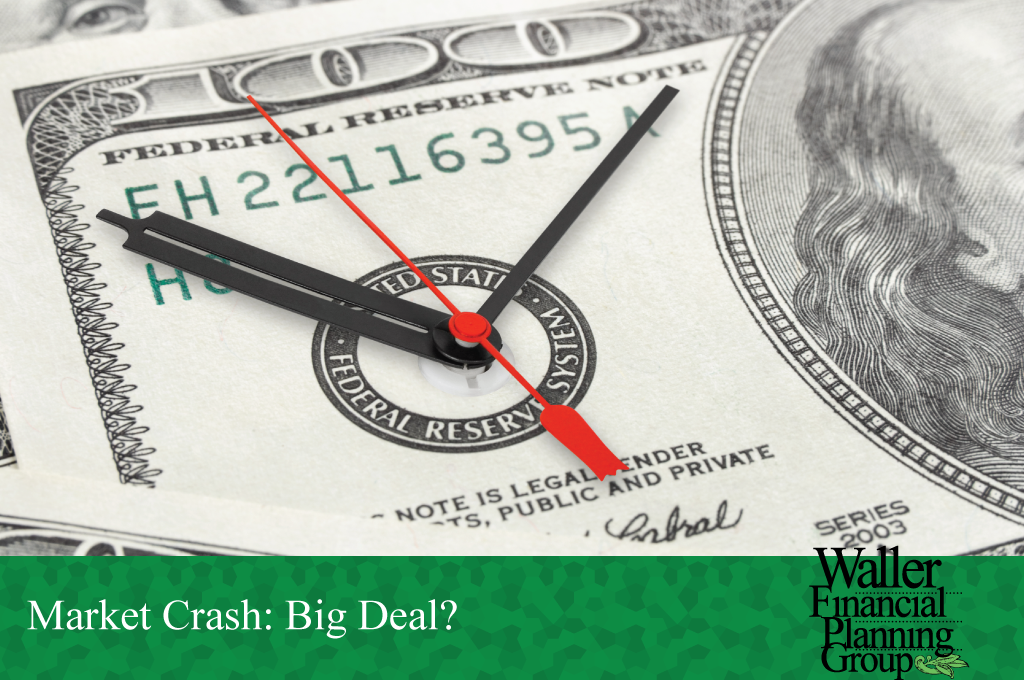
Yesterday the Dow Jones Industrial Average (Dow) closed at a new record high. Thirty years ago was the infamous Black Monday stock market crash. It is the largest one-day percentage drop we have ever experienced, with the Dow plummeting 22.6%.[1] The market was in a pretty good slide prior to that though, as the Dow had dropped about 14% over the preceding six weeks. Amazingly, the Dow was up about 40% for the year before the fall and actually ended the year in positive territory, at 2.26%.[2]
Since 1970, we’ve had four distinct stock market crashes. The drop in 1973-1974 was almost 43% and lasted just under two years. The market recovered the losses over the next two years. The previously mentioned 1987 drop is unrivaled in terms of loss in a single day. During the 2000-2003 Dot-Com drop, stocks lost almost 45% of their value. It took four years before the market recovered. This was the second longest recovery period, trailing the recovery period after the 1929 crash. During the 2007-2009 Great Recession drop, stocks fell almost 51%. The recovery period was just little over three years.[3]
We will eventually have another stock market crash, and it will be largely unavoidable. Regardless of how believable some evangelizing pundit may seem, the ability to predict the booms and busts of the market is not possible. No one can truly time the right time to buy and sell. Overall time in the market is one of the most important contributors for achieving good investment results. If you would have invested $1,000 at the beginning of 1970 into an investment that tracked the S&P 500 Index and never touched it, the investment would be worth more than $100,000 today. If you would have invested at the beginning of 2000, your account would be up more than two and a half times what you invested. Even if you invested at the peak of the market before the Great Recession crash, you would have still doubled your money.[4] History has illustrated that markets go up and they go down. Even though past performance is not indicative of future results, every time the market has crashed, it has only been a matter of time before it recovered and increased to new highs.
Experienced investors share they adhere to a disciplined investment philosophy, they do not allow emotion to dictate decisions and they buy assets when prices drop. Interestingly, when things are bad, most investors scrap their investment plan, get very emotional and sell assets as prices drop. DALBAR publishes a study on Quantitative Analysis of Investor Behavior, and the annual study has consistently highlighted the difference in market returns and investor returns. For the last 30 years, the annualized return of the S&P 500 Index is more than double the average annual stock returns of an investor.[5] The reason: investors make decisions to move in and out of their investments.
Our successful philosophy is rooted in understanding the purpose of the investment portfolio and knowing when it will be relied upon to meet your needs. We prefer to maintain a well-diversified portfolio that focuses on exposure to asset classes. One of the common threads of successful investing is self-restraint and adhering to your convictions. We do not risk what we cannot afford to lose.
The opinions voiced in this letter are for general information only and are not intended to provide specific advice or recommendations for any individual. All performance referenced is historical and is no guarantee of future results. The economic forecasts set forth in this printing may not develop as predicted and there can be no guarantee that strategies promoted will be successful. Stock investing involves risks, including loss of principal. There is no guarantee that a diversified portfolio will enhance overall return or outperform a non-diversified portfolio. Diversification does not protect against market risk.
[1] https://www.financial-planning.com/slideshow/black-monday-stock-market-crash-of-1987-30-years-later
[2] http://tradingninvestment.com/stock-market-historical-returns/
[3] 2017 Morningstar Research Presentation “Downturns and Recoveries”
[4] Morningstar Office 2013
[5] http://www.dalbar.com/QAIB/Index





